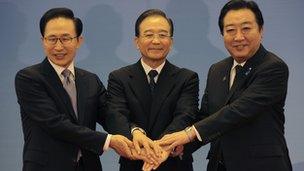China, S Korea and Japan set to begin free trade talks
- Published
Philip Poole, HSBC's Global Head of Macro & Investment Strategy, says it's a signficant move although many hurdles remain.
Chinese President Hu Jintao has met the leaders of South Korea and Japan, as the three countries agreed to begin negotiations on a free-trade pact.
The leaders were meeting in Beijing for two days of trilateral talks.
Although tensions with North Korea were discussed on Sunday, there was no mention of it in a <link> <caption>joint statement</caption> <url href="http://www.fmprc.gov.cn/eng/zxxx/t931395.htm" platform="highweb"/> </link> issued on Monday.
China is the biggest trading partner of both Japan and South Korea.
The three leaders also signed a trilateral investment agreement, which is seen as a stepping stone to a free-trade zone.
However as with other free-trade agreements between countries, this one could still face long negotiations and trade barriers, observers say.
Trade boost
The agreement on free trade talks was reached on Sunday.
"The establishment of a free-trade area will unleash the economic vitality of our region and give a strong boost to economic integration in East Asia," said Chinese Premier Wen Jiabao.
He also said the pact would help the nations at a time of rising trade protectionism.
Japanese Prime Minister Yoshihiko Noda said economic co-operation was essential to maintaining the Asia-Pacific region as the growth centre of the world economy.
Trade between the three countries reached $690bn in 2011, up from only $130bn in 1999, according to a Chinese government report.

A free-trade agreement in East Asia could rival the likes of the EU and Nafta
The leaders also agreed on Sunday to work together to ease regional disputes and tensions, specifically on the Korean Peninsula.
North Korea conducted a failed rocket launch last month and there are fears it is preparing another nuclear test.
South Korea's President Lee Myung-bak said the nations would not accept "further nuclear tests or further provocation" from North Korea.
"What is most urgent (for us) now is to make all-out efforts to prevent the escalation of tensions on the Korean Peninsula," Mr Wen Jiabao said at a joint news conference.
But a joint declaration issued after the talks made no mention of North Korea.